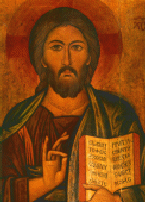|
RGH 2045H
|
Click here for the full RGH2045
syllabus (PDF) for the next academic year. The materials
contained on this web-site complement the full syllabus. [Under
revision].
|
|
|
Description:
Earliest Christianity saw Jesus Christ at its centre, but it struggled
to explain his person and works. This course studies the response
given in the first five centuries to Jesus's question: "Who do you
say that I am?" On-line primary source readings. Lectures, seminars,
short papers, research paper, final exam.
Sources for Lecture & Tutorial Readings:
1. The New Testament. New Revised Standard Version.
2. Basil Studer. Trinity & Incarnation: The Faith of the
Early Church. Ed. A. Louth. Trans. Matthias Westerhoff. Collegeville:
Liturgical, 1993.
3. JND Kelly. Early Christian Doctrines. Rev. ed San Francisco:
HarperCollins, 1978.
4. Some readings (articles) on reserve shelf or in reference section
of Regis library.
5. Primary source readings of the early authors available on my
website
http://individual.utoronto.ca/jskira/syllabus-christology451-00.htm
1. Introduction & Methodology
- Overview of the course; Researching in Patristic theology.
2. The Christology of Jesus - "Who did Jesus
Say He Was?" & the Christology of Paul
Reading: JP Meier. "Jesus," in The New Jerome Biblical
Commentary. Prentice Hall, 1990. 1316-1328; and Romans, Ephesians
& Phillipians.
Maps: Review this map
of the
growth of Christianity and this early
Byzantium map (PDF) to give you a sense of the world of Jesus,
and the early Christian writers. It is very important for you to
get a sense of "ancient geography."
3. The Christology of the Evangelists (I):
- "Who did they Say He Was?"
Reading: R. Brown. Introduction to New Testament Christology.
NY: Paulist, 1994. 103-152; and the gospels of Mark & Matthew.
4. The Christology of the Evangelists (II):
- "Who did they Say He Was?"
Reading: R. Brown. Introduction to New Testament Christology.
103-152; and the gospels of Luke & John.
5. Post-Apostolic Fathers - Didache, Barnabas,
1 & 2 Clement, Ignatius, Hermas
Readings: Studer. Trinity & Incarnation. Chp 1 &
3; Kelly. Early Xian Doctrines. Chp 6.1-2; 4.3.; and selected
primary sources.
Optional: Brief biographical
introduction to selected Byzantine authors.
6. Apologists & Anti-Gnostic Authors -
Justin, Irenaeus, Athenagoras, Tatian
Readings: Studer. Trinity & Incarnation. Chp. 4 &
5; Kelly. Early Xian Doctrines. Chp 4.4-6; 6.3.; and selected
primary sources.
7. Rome & Africa - Tertullian, Hippolytus,
Novation
Readings: Studer. Trinity & Incarnation; Chp. 6; Kelly. Early
Xian Doctrines. Chp 5.1-4; 6.4.and selected
primary sources.
8. Antioch & Alexandria - Clement, Origen,
Eusebius
Readings: Studer. Trinity & Incarnation. Chp. 7 &
8; Kelly. Early Xian Doctrines. Chp 5.6-7; 6.5-6.]; and selected
primary sources.
9. Arianism and Niceas - Arius, Athanasius, Hilary
Readings: Studer. Trinity & Incarnation. Chp. 9 &
10; Kelly. Early Xian Doctrines. Chp 9.1-6; 11.1-3; and selected
primary sources.
10. The Cappadocians - Basil the Great,
Gregory Nazianzus, Gregory of Nyssa, Macrina
Readings: Studer. Trinity & Incarnation. Chp. 11, 12
& 15; Kelly. Early Xian Doctrines. Chp 10.3-4; 11.4-5; and selected
primary sources.
11. Constantinople I & Later Latin Fathers
- Ambrose, Augustine
Readings: Studer. Trinity & Incarnation. Chp. 13 &
14; Kelly. Early Xian Doctrines. Chp 10.5-6; and selected
primary sources
>>> Review the questions from the previous
weeks, and apply the same sort of criteria/approaches in analyzing
the christology of the authors for Weeks 12 & 13.
12. Ephesus - Theodore of Mopseustia, John
Chrysostom, Cyril of Alexandria, Nestorius
Readings: Studer. Trinity & Incarnation. Chp. 16; Kelly.
Early Xian Doctrines. Chp 12.1-3; 11.6; and selected
primary sources.
13. Chalcedon & Summary - Leo, Eutyches
Readings: Studer. Trinity & Incarnation. Chp. 17 &
18; Kelly. Early Xian Doctrines. Chp 12.4-6; and selected
primary sources.
|
